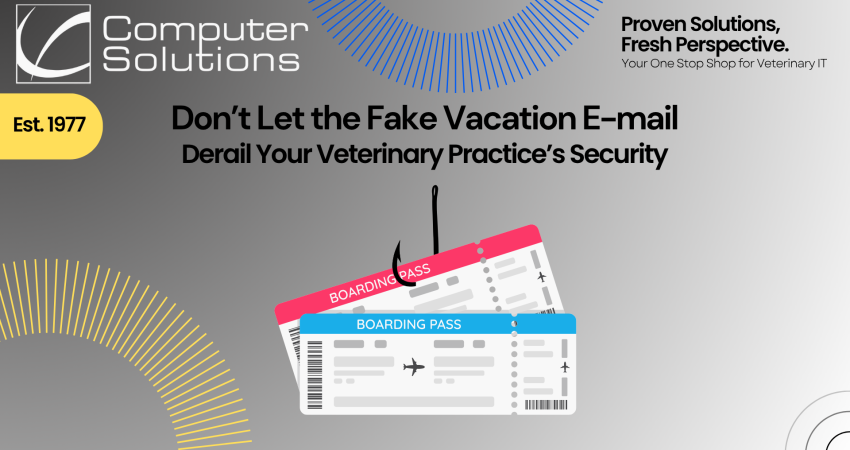
Posted by Computer Solutions on May 12, 2025
At Computer Solutions, we’re seeing a spike in a particular phishing scam that targets veterinary professionals and practice staff: the fake vacation confirmation e-mail.
Summer travel season is around the corner — and while you or your team may be booking a well-earned break, cybercriminals are booking opportunities to scam you.
Even seasoned professionals are falling for it — and it’s costing businesses more than just a few minutes of confusion.
How the Scam Works
1. A Fake Booking Confirmation Lands in Your Inbox
The e-mail looks like it’s from a legitimate source — Delta, Expedia, Marriott, or another well-known travel company. It’s clean, professional, and often includes logos, formatting, and even “support” numbers that look real.
Common subject lines include:
- “Your Trip To Miami Has Been Confirmed! Click Here For Details”
- “Your Flight Itinerary Has Changed – Click Here For Updates”
- “Action Required: Confirm Your Hotel Stay”
2. You Click and Get Redirected
The e-mail urges you to confirm your reservation, check your itinerary, or provide updated payment info. But when you click, you’re taken to a fake website designed to steal your login credentials.
3. Hackers Get In
- If you enter your password, they now have access to your airline, hotel, or email account.
- If you provide payment details, they may process fraudulent charges.
- Some links even install malware on your device, potentially compromising your entire network.
Why This Scam Works So Well
- It Looks Legit: The design and messaging are often indistinguishable from real booking emails.
- It Triggers Panic: “Flight changed” or “payment issue” headlines make people act fast.
- People Are Distracted: Vacation plans, patient appointments, emergencies — there’s a lot going on.
And in a veterinary clinic, the risk is even higher when business travel or conferences are involved.
Why This Matters to Vet Practices
If you or someone on your team handles travel — for CE events, speaking engagements, conferences, or practice expansion — they’re a target.
All it takes is one click from your office manager, lead tech, or associate vet to:
- Expose a company credit card
- Compromise shared passwords
- Open the door to ransomware or a data breach
How to Protect Your Practice
Here’s what we recommend:
1. Always verify booking emails by going directly to the airline or hotel website. Don’t click links.
2. Check the sender’s address. Fake domains look close but aren’t exact (e.g., @deltacom.com).
3. Train your staff. Anyone managing travel, bookings, or email should know how to spot phishing.
4. Use MFA. Multifactor authentication makes it much harder for hackers to log in even if they get your password.
5. Secure your email. Business email accounts should be filtered for spam, suspicious links, and attachments.
Stay One Step Ahead — Before It Costs You
These scams aren’t going away — they’re only getting more convincing.
Let’s make sure your practice isn’t caught off guard by fake vacation e-mail.
Start with a FREE Cybersecurity Assessment from Computer Solutions. We’ll evaluate your current setup, flag vulnerabilities, and help you put real protection in place.
Visit welinku.com to schedule your FREE assessment today.
You take care of pets and their people. We’ll take care of your cybersecurity.
If you want to see more content like this, check out the rest of our blog or subscribe to our newsletter on LinkedIn!
Discover more from Computer Solutions
Subscribe to get the latest posts sent to your email.







